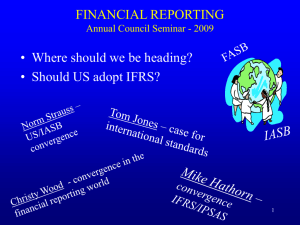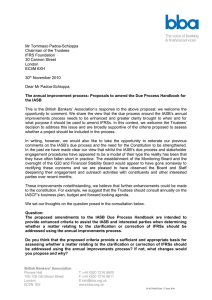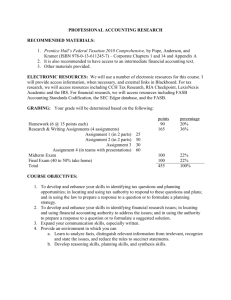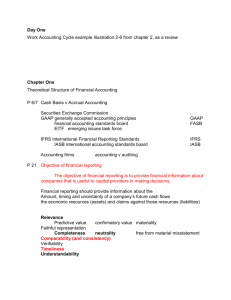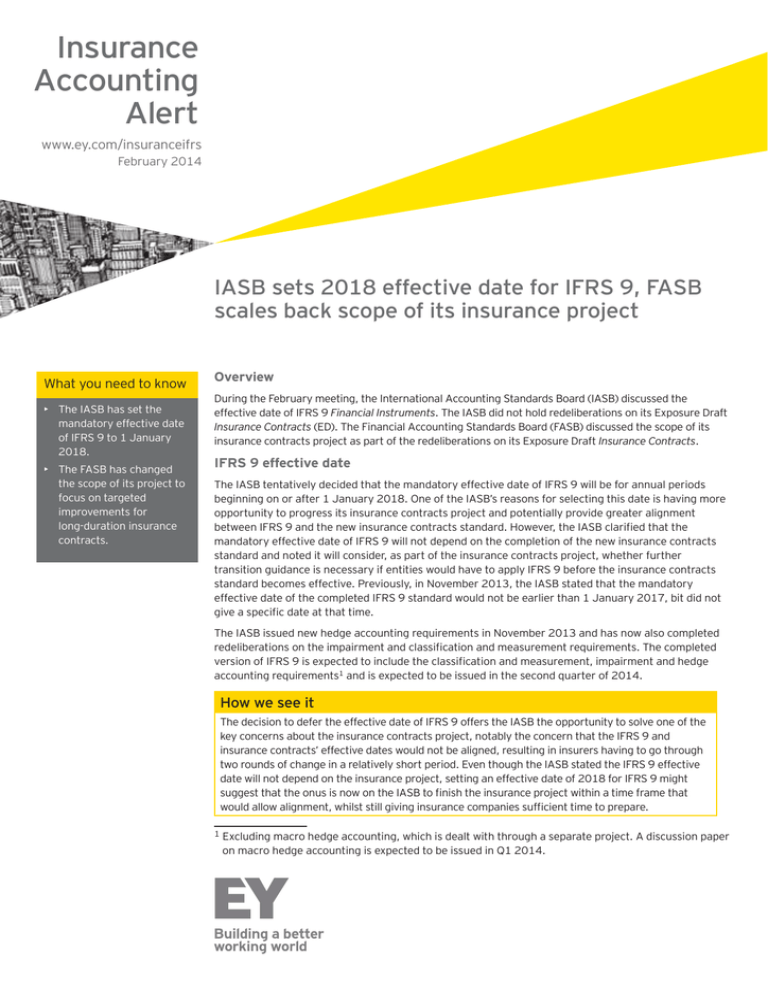
Insurance
Accounting
Alert
www.ey.com/insuranceifrs
February 2014
IASB sets 2018 effective date for IFRS 9, FASB
scales back scope of its insurance project
What you need to know
The IASB has set the
mandatory effective date
of IFRS 9 to 1 January
2018.
The FASB has changed
the scope of its project to
focus on targeted
improvements for
long-duration insurance
contracts.
Overview
During the February meeting, the International Accounting Standards Board (IASB) discussed the
effective date of IFRS 9 Financial Instruments. The IASB did not hold redeliberations on its Exposure Draft
Insurance Contracts (ED). The Financial Accounting Standards Board (FASB) discussed the scope of its
insurance contracts project as part of the redeliberations on its Exposure Draft Insurance Contracts.
IFRS 9 effective date
The IASB tentatively decided that the mandatory effective date of IFRS 9 will be for annual periods
beginning on or after 1 January 2018. One of the IASB’s reasons for selecting this date is having more
opportunity to progress its insurance contracts project and potentially provide greater alignment
Z]lo]]fA>JK1Yf\l`]f]oafkmjYf[][gfljY[lkklYf\Yj\&@go]n]j$l`]A9K:[dYjaÕ]\l`Yll`]
mandatory effective date of IFRS 9 will not depend on the completion of the new insurance contracts
standard and noted it will consider, as part of the insurance contracts project, whether further
transition guidance is necessary if entities would have to apply IFRS 9 before the insurance contracts
standard becomes effective. Previously, in November 2013, the IASB stated that the mandatory
effective date of the completed IFRS 9 standard would not be earlier than 1 January 2017, bit did not
_an]Ykh][aÕ[\Yl]Yll`Yllae]&
The IASB issued new hedge accounting requirements in November 2013 and has now also completed
j]\]daZ]jYlagfkgfl`]aehYaje]flYf\[dYkkaÕ[YlagfYf\e]Ykmj]e]flj]imaj]e]flk&L`][gehd]l]\
n]jkagfg^A>JK1ak]ph][l]\lgaf[dm\]l`][dYkkaÕ[YlagfYf\e]Ykmj]e]fl$aehYaje]flYf\`]\_]
accounting requirements1 and is expected to be issued in the second quarter of 2014.
How we see it
The decision to defer the effective date of IFRS 9 offers the IASB the opportunity to solve one of the
key concerns about the insurance contracts project, notably the concern that the IFRS 9 and
insurance contracts’ effective dates would not be aligned, resulting in insurers having to go through
two rounds of change in a relatively short period. Even though the IASB stated the IFRS 9 effective
date will not depend on the insurance project, setting an effective date of 2018 for IFRS 9 might
km__]kll`Yll`]gfmkakfgogfl`]A9K:lgÕfak`l`]afkmjYf[]hjgb][loal`afYlae]^jYe]l`Yl
ogmd\YddgoYda_fe]fl$o`adklkladd_anaf_afkmjYf[][gehYfa]kkm^Õ[a]fllae]lghj]hYj]&
1 Excluding macro hedge accounting, which is dealt with through a separate project. A discussion paper
on macro hedge accounting is expected to be issued in Q1 2014.
EY | Assurance | Tax | Transactions | Advisory
Scope of FASB’s insurance project scaled back
On 19 February 2014, the FASB discussed the scope of its
insurance contracts project and, as a result, tentatively decided to
scale back the scope to focus on targeted improvements to the
current guidance for long-duration contracts and disclosures for
short-duration contracts. Entities will continue to apply today’s
measurement and recognition guidance to short-duration contracts
such as property and casualty, short-term health, mortgage,
ÕfYf[aYd_mYjYfl]]Yf\lald]afkmjYf[][gfljY[lk&
The FASB also tentatively decided that contracts written by
non-insurance entities will not be subject to the guidance for
insurance. At a future date, the FASB may consider whether to
require non-insurance entities to apply the insurance guidance to
certain contracts they write.2
How we see it
The FASB’s decisions do not directly affect the IASB’s proposals.
However, we expect that the IASB will rethink some elements of
alkhjgb][lhdYf&Kh][aÕ[Yddq$l`]A9K:Yf\>9K:`Y\Z]]f
anticipating a continuation of their joint discussions on certain
topics in their respective EDs to explore further ways to achieve
convergence. Following the FASB’s recent decision, it is unclear
whether the planned joint redeliberations will occur as the scope
and timing of the FASB’s discussions may differ from those of
the IASB.
What’s next?
The IASB plans to hold its next meeting in March; the topics have
not yet been announced, nor have the IASB or the FASB indicated
whether they will hold joint redeliberations on insurance contracts
in March, as scheduled.
During the IASB’s Accounting Standards Advisory Forum (ASAF)
meeting in March, the IASB staff plans to ask ASAF members for
their views on how to respond to comment letter feedback on
certain topics, notably the use of Other Comprehensive Income,
unlocking the Contractual Service Margin and insurance contracts’
revenue.3
2 See EY’s publication To the Point No. 2014-06, FASB scales back
scope of insurance contracts project, for a summary of the FASB
discussion.
3 ASAF March 2014 Agenda papers.
About EY
EY is a global leader in assurance, tax, transaction and advisory
services. The insights and quality services we deliver help build trust
and confidence in the capital markets and in economies the world over.
We develop outstanding leaders who team to deliver on our promises
to all of our stakeholders. In so doing, we play a critical role in building
a better working world for our people, for our clients and for our
communities.
EY refers to the global organization and may refer to one or more of
the member firms of Ernst & Young Global Limited, each of which is
a separate legal entity. Ernst & Young Global Limited, a UK company
limited by guarantee, does not provide services to clients. For more
information about our organization, please visit ey.com.
About EY’s Global Insurance Center
Insurers must increasingly address more complex and converging
regulatory issues that challenge their risk management approaches,
operations and financial reporting practices. EY’s Global Insurance
Center brings together a worldwide team of professionals to help
you succeed — a team with deep technical experience in providing
assurance, tax, transaction and advisory services. The Center works to
anticipate market trends, identify the implications and develop points
of view on relevant sector issues. Ultimately it enables us to help you
meet your goals and compete more effectively.
© 2014 EYGM Limited.
All Rights Reserved.
EYG No.AU2205
ED None
In line with EY’s commitment to minimize its impact on the environment, this document has
been printed on paper with a high recycled content.
This material has been prepared for general informational purposes only and is not intended
to be relied upon as accounting, tax, or other professional advice. Please refer to your advisors
for specific advice.
ey.com

